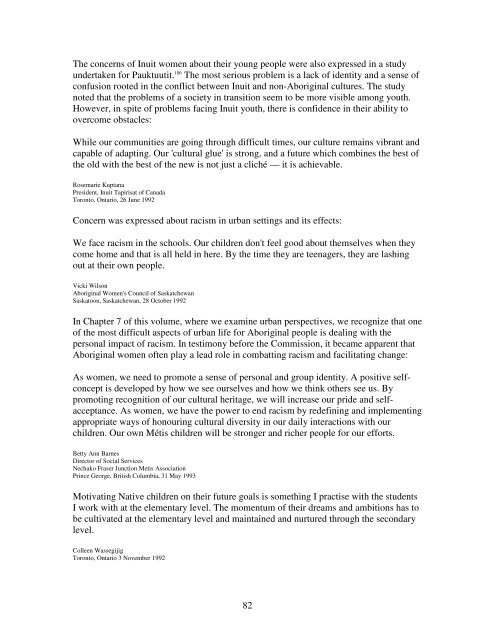2. Women's Perspectives - Christian Aboriginal Infrastructure ...
2. Women's Perspectives - Christian Aboriginal Infrastructure ...
2. Women's Perspectives - Christian Aboriginal Infrastructure ...
Create successful ePaper yourself
Turn your PDF publications into a flip-book with our unique Google optimized e-Paper software.
The concerns of Inuit women about their young people were also expressed in a study<br />
undertaken for Pauktuutit. 106 The most serious problem is a lack of identity and a sense of<br />
confusion rooted in the conflict between Inuit and non-<strong>Aboriginal</strong> cultures. The study<br />
noted that the problems of a society in transition seem to be more visible among youth.<br />
However, in spite of problems facing Inuit youth, there is confidence in their ability to<br />
overcome obstacles:<br />
While our communities are going through difficult times, our culture remains vibrant and<br />
capable of adapting. Our 'cultural glue' is strong, and a future which combines the best of<br />
the old with the best of the new is not just a cliché — it is achievable.<br />
Rosemarie Kuptana<br />
President, Inuit Tapirisat of Canada<br />
Toronto, Ontario, 26 June 1992<br />
Concern was expressed about racism in urban settings and its effects:<br />
We face racism in the schools. Our children don't feel good about themselves when they<br />
come home and that is all held in here. By the time they are teenagers, they are lashing<br />
out at their own people.<br />
Vicki Wilson<br />
<strong>Aboriginal</strong> <strong>Women's</strong> Council of Saskatchewan<br />
Saskatoon, Saskatchewan, 28 October 1992<br />
In Chapter 7 of this volume, where we examine urban perspectives, we recognize that one<br />
of the most difficult aspects of urban life for <strong>Aboriginal</strong> people is dealing with the<br />
personal impact of racism. In testimony before the Commission, it became apparent that<br />
<strong>Aboriginal</strong> women often play a lead role in combatting racism and facilitating change:<br />
As women, we need to promote a sense of personal and group identity. A positive selfconcept<br />
is developed by how we see ourselves and how we think others see us. By<br />
promoting recognition of our cultural heritage, we will increase our pride and selfacceptance.<br />
As women, we have the power to end racism by redefining and implementing<br />
appropriate ways of honouring cultural diversity in our daily interactions with our<br />
children. Our own Métis children will be stronger and richer people for our efforts.<br />
Betty Ann Barnes<br />
Director of Social Services<br />
Nechako Fraser Junction Metis Association<br />
Prince George, British Columbia, 31 May 1993<br />
Motivating Native children on their future goals is something I practise with the students<br />
I work with at the elementary level. The momentum of their dreams and ambitions has to<br />
be cultivated at the elementary level and maintained and nurtured through the secondary<br />
level.<br />
Colleen Wassegijig<br />
Toronto, Ontario 3 November 1992<br />
82
















